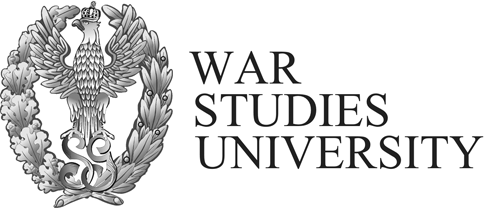Online first
Current issue
All issues
About
Aims and scope
Peer review process
Publication policy and ethics & malpractice statement
Editorial Board
Reviewers
Publisher
Guide for authors
Call for papers
Book Reviews
Special Issues Archive
New and emerging technologies in defence education, training and governance
Arctic energy policy and security of the Russian Federation
1
National Defence University, Warsaw, Poland
Publication date: 2016-03-31
Security and Defence Quarterly 2016;10(1):35-51
KEYWORDS
ABSTRACT
In this article, the author examines the Arctic region in the context of the energy and
security policy of the Russian Federation. The author emphasises the factors which currently
influence the increasing interest in the Arctic of the countries which claim rights to this
region, which are: the US, Canada, Denmark, Norway and the Russian Federation. Among
the most important factors indicating the essence of the Arctic, the author points out, inter
alia: plenty of energy deposits, which because of the changing climate, are more available,
the size of the Arctic area and new transport routes.
The author indicates the possibilities of using the Russian Federation policy regarding the Arctic in order to, among other things, strengthen the country’s international position. The author also presents the extent to which claiming the right to exclusive exploitation of mineral resources by the Russian Federation is the real motive of its actions and its intention to totally subordinate the Arctic area. Simultaneously, an attempt is made to answer the question whether the Arctic is likely to be a place of military conflict in the future?
The article also examines the issues related to the legal status of the Russian Federation regarding the Arctic, the political activity of the Russian Federation in this region and the possibility of the Russian Federation exploiting energy resources in the Arctic region.
The article brings together the issues connected with the Russian Federation and its policy in the region of the Arctic Ocean, and also portrays the importance of the Arctic in the changing international security environment.
The author indicates the possibilities of using the Russian Federation policy regarding the Arctic in order to, among other things, strengthen the country’s international position. The author also presents the extent to which claiming the right to exclusive exploitation of mineral resources by the Russian Federation is the real motive of its actions and its intention to totally subordinate the Arctic area. Simultaneously, an attempt is made to answer the question whether the Arctic is likely to be a place of military conflict in the future?
The article also examines the issues related to the legal status of the Russian Federation regarding the Arctic, the political activity of the Russian Federation in this region and the possibility of the Russian Federation exploiting energy resources in the Arctic region.
The article brings together the issues connected with the Russian Federation and its policy in the region of the Arctic Ocean, and also portrays the importance of the Arctic in the changing international security environment.
REFERENCES (32)
2.
A. Głogowska-Balcerzak, Do kogo będzie należeć biegun? Status prawny Arktyki, http://www.stosunki.pl/?q=cont...
4.
Konwencja Narodów Zjednoczonych o prawie morza sporządzona w Montego Bay dnia 10 grudnia 1982 r. art. 87, http://www.abc.com.pl/du-akt/-... [Access: 15.03.2016].
5.
Konwencja Narodów Zjednoczonych o prawie morza sporządzona w Montego Bay dnia 10 grudnia 1982 r. art. 88, http://www.abc.com.pl/du-akt/-... [Access: 15.03.2016].
6.
The continental shelf of a coastal state comprises the seabed and subsoil of the submarine areas that extend beyond its territorial sea throughout the length of the natural prolongation of its land territory to the outer edge of the continental margin or to a distance of 200 nautical miles from the baselines from which the breadth of the territorial sea is measured if the outer edge of the continental margin does not extend to that distance, (see) the United Nations Convention on the Law of the Sea, Article 76, par 1
7.
„Arktika 2007” was an expedition whose aim was to research the seabed in order to substantiate its claim that the Lomonosov Ridge is a continuation of the continental shelf. The expedition led to series of controversies because , during the event, it planted a Russian flag on the seabed at the North Pole. The other countries dismissed the flag planting as purely symbolic and legally meaningless. See M. Rzeszutko-Piotrowska, Aktywność Federacji Rosyjskiej w regionie Arktyki-wybrane problemy rywalizacji mocarstw, „Rocznik Bezpieczeństwa” 2014, vol. 8, nr 1, p. 51-62.
8.
W. Janicki, Rywalizacja w Arktyce: przesłanki polityczne czy gospodarcze?, [w:] „Arktyka na początku XXI wieku. Między współpracą a rywalizacją”, (ed.) M. Łuszczuk, Wydawnictwo Uniwersytetu Marii Curie-Skłodowskiej, Lublin 2013, p. 109.
9.
T. Kijewski, Rywalizacja o surowce energetyczne w Arktyce, „Bezpieczeństwo Narodowe” 2009, nr 9-10, p. 276.
10.
K. Kubiak, Interesy i spory państw w Arktyce, Wydawnictwo Naukowe Dolnośląskiej Szkoły Wyższej, Wrocław 2009, p. 178-180.
11.
A. Hołdys, Dania, Kanada i Rosja: Bitwa o Arktykę, „Gazeta Wyborcza” 06.05.2006, http://wiadomosci.gazeta.pl/wi..., [access: 16.03.2016].
12.
M.L. Roi, Russia: The Greatest Arctic Power?, „Journal of Slavic Military Studies”, Oct- Dec 2010, Vol. 23 Issue 4, p. 552. doi:10.1080/13518046.2010.525465.
13.
P. Zaleski, Arktyka – nowe pole walki o surowce energetyczne, „Nowa Energia”2014, nr 5-6, p. 1, http://www.cire.pl/pokaz-pdf-%..., [access: 17.03.2016].
15.
The author’s own translation based on Основы государственной политики Российской Федерации в Арктике на период до 2020 года и дальнейшую перспективу, http://rg.ru/2009/03/30/arktik...
16.
See: Военная доктрина Российской Федерации, poz. 32 „Основные задачи Вооруженных Сил, других войск и органов в мирное время”, pkt. у, http:// rg.ru/2014/12/30/doktrina-dok.html
17.
Морская Доктрина Российской Федерации на период до 2020 года, http://archive. kremlin.ru/text/docs/2001/07/58035.shtml
18.
M. Jarocki, M. Łuszczuk, K. Kubiak, P. Godlewski, Arktyka jako nowy obszar geopolitycznej rywalizacji państw i mocarstw, Raport Fundacji „Amicus Europae”, Warszawa 2013, p. 17.
19.
See: M. Jarocki, M. Łuszczuk, K. Kubiak, P. Godlewski, Arktyka jako nowy obszar geopolitycznej rywalizacji państw i mocarstw, Raport Fundacji „Amicus Europae”, Warszawa 2013, p. 18.
20.
See: Aktywność Rosji w Arktyce, Biuro Bezpieczeństwa Narodowego, https://www. bbn.gov.pl/pl/prace-biura/publikacje/analizy-raporty-i-nota/6393,NOTATKA-BBN- Aktywnosc-Rosji-w-Arktyce.html?search=9271
21.
T. Pedersen, Debates over the Role of the Arctic Council, „Ocean Development & International Law” 2012, Vol. 43 Is. 2, p. 147.
22.
E.J. Molenaar, Current and Prospective Roles of the Arctic Council System within the Context of the Law of the Sea, „International Journal of Marine & Coastal Law”, Sep. 2012, Vol. 27 Issue 4, p. 570.
23.
M. Jarocki, Polityka Federacji Rosyjskiej wobec Arktyki, http://www.psz.pl/117-polityka... polityka-federacji-rosyjskiej-wobec-arktyki
24.
See: T. Pedersen, Debates over the Role of the Arctic Council, „Ocean Development & International Law” 2012, Vol. 43 Is. 2, p.149-151.
25.
T. Pedersen, Debates over the Role of the Arctic Council, „Ocean Development & International Law” 2012, Vol. 43 Is. 2, p. 149-151
26.
А. Хроленко, США и Россия в Арктике: напряжение растет, http://ria.ru/ analytics/20151023/1306967014.html, [access: 17. 03. 2016].
27.
M. L. Roi, Russia: The Greatest Arctic Power?, „Journal of Slavic Military Studies”, Oct- Dec 2010, Vol. 23 Iss. 4, p. 561. doi: 10.1080/13518046.2010.525465.
28.
90 Billion Barrels of Oil and 1,670 Trillion Cubic Feet of Natural Gas Assessed in the Arctic, United States Geological Survey, 23 lipca 2008 r., http://www.usgs.gov/newsroom/ article.asp?ID=1980&from=rss_home#.Vuv5tbxFP0h, [dostęp: 18.03.2016 r.].
31.
М. Золотова, Арктике нет альтернативы, http://www.odnako.org/almanac/ material/arktike-net-alternativi/
CITATIONS (1):
1.
The Role of Green Economy in Strategic Socio-Economic Development of the Arctic Zone
E Degtyaryova, G Leyman
IOP Conference Series: Earth and Environmental Science
E Degtyaryova, G Leyman
IOP Conference Series: Earth and Environmental Science
Share
RELATED ARTICLE
We process personal data collected when visiting the website. The function of obtaining information about users and their behavior is carried out by voluntarily entered information in forms and saving cookies in end devices. Data, including cookies, are used to provide services, improve the user experience and to analyze the traffic in accordance with the Privacy policy. Data are also collected and processed by Google Analytics tool (more).
You can change cookies settings in your browser. Restricted use of cookies in the browser configuration may affect some functionalities of the website.
You can change cookies settings in your browser. Restricted use of cookies in the browser configuration may affect some functionalities of the website.




